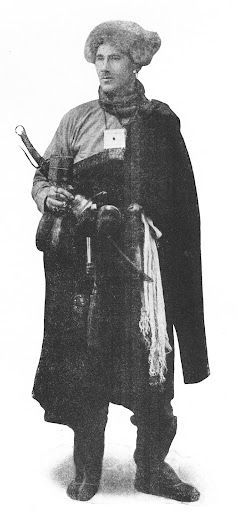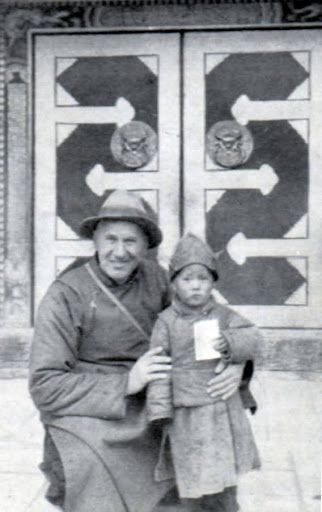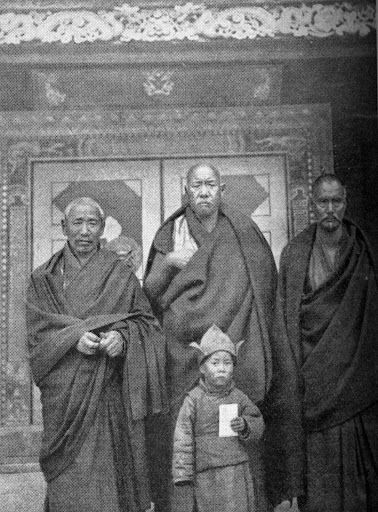Frank Learner
One of the most effective missionary couples in the history of Tibetan work were the British pair Frank and Annie Learner, who invested more than three decades of their lives in the Amdo Tibetans.
Frank was born in 1886 to a farming family from Norfolk, England; while Annie Baxter arrived in China in 1910, a year before Frank. They were married in Sichuan Province in February 1914, and after studying Chinese, they headed west to the Tibetan border, which was to remain their home for many years.
For the first few years the Learners focused their efforts on reaching the Han Chinese in Xining, but that started to change in 1916, after Frank accompanied French Ridley on a trip to the famous 600-year-old Butter Lantern Festival at the Kumbum Monastery—where they mingled with tens of thousands of Tibetans from far-flung areas. Learner remarked:
"Mr. Ridley and I had a splendid time preaching during this little visit. We set up a book and preaching stall in the busiest part of the fair, which we made our headquarters.... We both had splendid sales. What a great change has come about with regard to these Tibetans. In past years they would have nothing to do with our books, and would not have them even as a gift. Now they seem quite willing to buy a Gospel. I also distributed a great many picture tracts, which were very willingly received. Praise God!
I would specially ask prayer for the work among these people. To see the intense interest and earnestness of these poor heathen is truly impressive. O that we Christians, who worship the living Christ, were even half as earnest as these heathen people who worship a dead Buddha!"
One afternoon while he was at Kumbum, Learner felt deeply burdened for the Tibetan people. He climbed a hill overlooking the monastery, and the Spirit of God deeply touched his heart. He later recalled:
"Sitting on the grassy slopes, I gazed at the mountains which separate China from Tibet. Their peaks were sparkling in the afternoon sun, and as my eyes rested on the purity of their whiteness, the question, 'What is beyond?' thrust itself upon me. I thought of the millions of lips uttering meaningless prayers, millions of bodies daily bowed in prostrations, awaiting the blessing of men who call themselves living Buddhas. And so little was being done to bring the Light to them! Suddenly it seemed as if a voice was speaking! 'I want you to do something for these people!'"
Not long after returning from a trip to a nomadic area, the Learners' little son Alfred suddenly died from whooping cough. Annie was pregnant at the time, and just six months later they announced the arrival of a second son, James.
Frank continued to travel widely as he spread God's Word among the Amdo, and at the start of 1918 he reported: "We have sold about 600-odd Tibetan Gospels, and truly this is very much to praise God for. Whereas in previous years, the Tibetans would not have a Gospel as a gift, now they are willing to put out cash, and very willingly too. A great change is coming over this people."
Literature distribution continued to be a major part of Frank Learner's ministry among the Tibetans, and in 1920 when he reflected on his work, he remarked:
"During the past six years while we have been living in Xining...we have sold about 1,000 Gospels yearly in the Tibetan language, besides a great quantity of pictures and tracts being given away. Journeys have been made over the border into Tibet itself, and on the whole we have been well received by the Tibetans, having been to their tents, and they in return visiting us. On such occasions, Gospels and tracts have been exchanged for butter and milk, etc."
The Tibetan Gospel Inn
Although Frank Learner had distributed gospel literature widely among Amdo Tibetans as well as the Han Chinese, Hui, Tu and other ethnic groups, a more effective method of evangelizing was about to open up for the energetic missionary. One day, during prayer, the idea of operating a Tibetan 'Gospel Inn' came to his mind. He immediately saw the great possibilities that such a place would provide—an inn where Tibetans from all over the region could stay and be exposed to the gospel of Jesus Christ for the first time.
As the Learners prepared to depart on a scheduled trip back to Britain, they prayerfully asked God to put all the plans together and to provide the necessary funds to purchase a strategically-located facility. Frank later recalled how God answered their prayers:
"In talking to Mrs. Learner, I remarked that 'It would be very encouraging if we could see one Tibetan showing real interest in the gospel before we go home to England at the end of the year.' I even went further and said, 'Oh that one Tibetan could be baptized before we go home! I would take it as a definite encouragement from God.' Little did I know that the answer was so near.
There came a knock on the door. I called out, 'Come in,' and to my surprise in walked a Tibetan. I invited him to sit down and drink some tea and partake of some of my meal. He did so, and we had a long talk together.... Ji Fajia has since entered his name on our books as an enquirer. He also persuaded his uncle to do the same."
The Learner family completed their furlough and returned to Xining with a renewed vision for the evangelization of Tibet. They also returned with a larger family as a daughter, Mary, had been born in London during their time away. Sadly, tragedy struck when Mary died from scarlet fever in February 1924, aged just three.
Ji Fajia, meanwhile, had grown in knowledge and grace, but his commitment to Christ had not come easily. Learner said of his colleague:
"He is the first Tibetan who became interested in the gospel in Xining.... The dear man has suffered very much for the sake of the gospel, but through it all has remained steadfast. He has been beaten unmercifully by the lamas for not continuing his false worship. On more than one occasion he has been imprisoned in the lamasery prison, being chained down to the ground, so as to not be able to either sit down or stand upright all night; a most painful position indeed.
He has been in several other ways persecuted, but how I praise God that He has given him strength to bear it all. To hear him tell the story brings tears to my eyes, and I wonder if I would be as firm should the test come. He has destroyed all his idols, which meant much to him, but he did it joyfully.... His wife and sons are also quite interested, and I hope it will not be long before I have the joy of baptizing them too."
Plans came together by the providence of God, and the Tibetan Gospel Inn was opened—the first of its kind anywhere in Tibet. After much prayer and searching, the small district of Maobosheng, north of Datong, was chosen as the location for this unique project. It was an area frequented by Tibetans, Hui, Han Chinese and members of the Mongolian-speaking Tu ethnic group. Learner described the property:
"The compound comprises three courtyards, one leading into the other, the whole length being about 45 yards. The lower courtyard is used for stable accommodation, for no Tibetan comes without his animal, be it horse, mule, camel, donkey or yak. This stable will hold about 30 animals, but it often proves too small. (One day a Mongolian prince arrived with a caravan of nearly 100 camels). Around the lower courtyard are kitchens and outhouses.
Next we come to the central courtyard where we are at once attracted to the chief building of the premises—the brightly-painted chapel.... Its walls are decorated with Bible pictures and large sheets of colored texts in Tibetan. The building will seat about 50 people. On leaving the chapel, we follow through to the upper courtyard around which are most of the guest rooms."
A large shipment of Bibles, New Testaments and other gospel literature in several languages was ordered, and Learner was determined that no person would visit the Inn without hearing the gospel.
News soon spread throughout the Tibetan world of the warm hospitality provided there, and lamas, pilgrims and bandits from a vast area came and stayed at the inn. Every evening, after dinner, the gospel was shared with the guests, and many loved to sing the simple hymns in their native tongues. Each guest received gospel literature, which was taken back home, often hundreds of miles away, to be read and re-read by friends and family members. The inn proved an immediate success, with Learner noting: "In our first year, we received as many as 800 visitors, and since then numbers have been on the increase. None go away without having heard of Jesus Christ."
Visiting Tibetan Christians
While Frank Learner was responsible for overseeing the Gospel Inn, his soul continued to yearn for the unexplored Tibetan regions, and often for weeks at a time he would visit Tibetan, Han Chinese and other scattered believers. In 1927 he returned from one trip and filed this joyful report:
"We visited several of the outstations and lonely centers, and rejoiced to find that the great majority of the Christians had remained faithful.... Over ten places were visited, and 73 homes where there were either one or more Christians living. We had the joy of staying in the homes of two of our Tibetan Christians, and found them well and rejoicing. Oh, the kindness of those dear people! They did all that they possibly could to make us happy and comfortable, even turning out of their own bedrooms to make way....
In closing I must mention the Tibetan Gospel Inn.... During the past few months the place has been packed out. We have had all kinds of guests, from the Incarnate Buddha to the common lama, or cattle farmer. All are treated alike, and all are made as comfortable as it is in our power to make them.
There are nine people now whom we can claim for God. Three have been baptized, while six are counted as enquirers.... We have had two rather remarkable conversions. One, a man who lives on the other side of the great Kokonor [Qinghai] Lake, had been staying with us for some weeks. He had attended the Tibetan services, and evidently had been taking in much more than we realized. At the end of one of the evening services he left his seat and came to the front, taking his khata (scarf of blessing) in both hands, and presented it to the God of Heaven, for, said he, 'You are the true God, and I will serve You until the end of my days.'
I brought him along to my room afterwards, and soon found that he really meant what he had said. This old man, now 70 years of age, has now gone back again to his home over the border, and we pray that he may be able to live the Christian life among his heathen friends and relatives."
Learner later received news that the old man, whose name was Lha-jar, had remained true to the faith. The missionary added:
"We were told also of the change in his life. Formerly he had been known as a robber and even a murderer, but now he was a new creature in Christ Jesus."
Despite the turmoil affecting hundreds of millions of people throughout China in the 1930s due to the civil war, the work of the Gospel Inn continued to have a far-reaching impact throughout the Tibetan world. In 1934, the inn celebrated its tenth year, with Learner reflecting:
"During this time, some 10,000 Tibetans have passed through its doors. Some come for shorter periods, some for longer. The great aim is that every Tibetan who makes use of the inn shall hear about the Lord Jesus Christ. Many have heard of Him there for the first time.
Tibetans from all over Tibet visit us. Whereas before they had to stay at Chinese Inns, and were at the mercy of Chinese innkeepers, who fleeced them at every turn, now they come to a place where they feel they have friends, who are willing to help them. The inn is free, for accommodation and service are free. They bring their own food, and also fodder for their horses, for no Tibetans travel on foot. They either have horses, mules, yaks, or camels.
The chief feature of the inn is the little chapel which, when filled to overflowing, will hold about 60 Tibetans.... Believe me when I say it is the gospel, and the pure gospel, that is preached, and this must and does bear fruit.... We distribute God's Word in Tibetan freely, and we have heard of some portions even filtering through to Lhasa.... What friendliness we find when traveling among these dear Tibetans, and what hospitality is shown! We count them among our dearest friends and they in turn treat us as friends also."
With the little Dalai Lama
In 1939, Learner heard that the newly-appointed Fourteenth (and current) Dalai Lama, who was just four-years-old at the time, was residing at the Kumbum Monastery. Such was the deep respect Learner had gained among the chief lamas there, that when he asked if he could meet the young boy, his request was immediately granted. The missionary told how:
"The little lad was brought to the large guest hall where I was waiting, and was presented to me. What a dear wee chap he was. He was not in the least afraid, but most friendly. I won his friendship right from the first by presenting him with some color Tibetan Gospel cards, which he eagerly accepted. His parents are just common Tibetan farmers. I felt sorry for the wee fellow, for I thought he should have been with his mother. In a short time he will be taken to Lhasa, the capital of Tibet. I wonder if he will take the Tibetan Gospel cards with him when he goes! I sincerely hope so."
Despite the outbreak of the Second World War, and with China in turmoil due to civil war, Learner's passion to share the gospel with the Amdo Tibetans remained undiminished. In 1944 he made yet another trip to the Kumbum butter festival, which proved to be his last.
Frank Learner had wholeheartedly served the Lord and had come to be widely respected by the people of Xining and surrounding districts. With the society plunging deeper into chaos, the Learners were finally forced to leave China in 1945, leaving behind many committed Tibetan believers.
Frank hoped to remain involved in missions by speaking in churches and mobilizing new workers, but the arduous journeys had taken a toll on his body, and he passed away in March 1947, soon after his 61st birthday. Annie Learner continued to live until 1973, when she went to her eternal reward at the age of 88.
© This article is an extract from Paul Hattaway's book ‘Tibet: The Roof of the World’. You can order this or any of The China Chronicles books and e-books from our online bookstore.
1. David V. Plymire, High Adventure in Tibet: The Life and Labors of Pioneer Missionary Victor Plymire (Ellendale, ND: Trinity Print'n Press, 1983), p. 25.
2. Plymire, High Adventure in Tibet, pp. 47-48.
3. Plymire, High Adventure in Tibet, p. 51.
4. Plymire, High Adventure in Tibet, p. 64.
5. Plymire, High Adventure in Tibet, p. 65.
6. Covell, The Liberating Gospel in China, p. 70.
7. Plymire, High Adventure in Tibet, pp. 70-71.
8. Plymire, High Adventure in Tibet, p. 73.
9. Plymire, High Adventure in Tibet, p. 74.
10. Plymire, High Adventure in Tibet, p. 79.
11. Plymire, High Adventure in Tibet, p. 86.
12. Plymire, High Adventure in Tibet, pp. 107-108.
13. Plymire, High Adventure in Tibet, p. 114.
14. Plymire, High Adventure in Tibet, pp. 130-31.
15. Plymire, High Adventure in Tibet, p. 192.
16. Plymire, High Adventure in Tibet, pp. 192-93.
17. Plymire, High Adventure in Tibet, p. 197.
18. Plymire, High Adventure in Tibet, p. 217.









